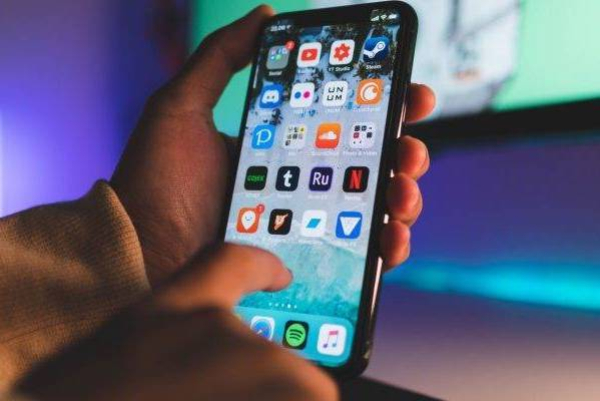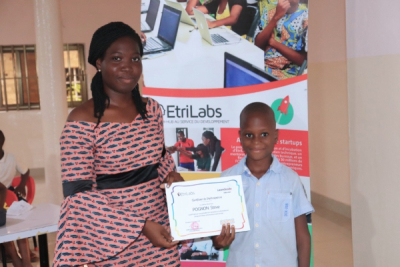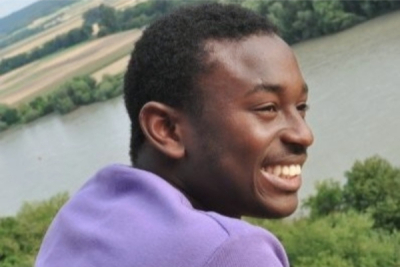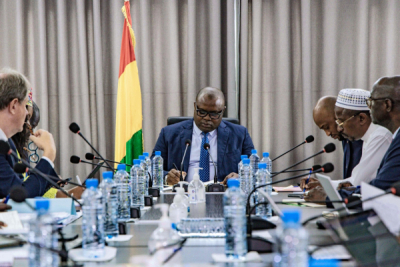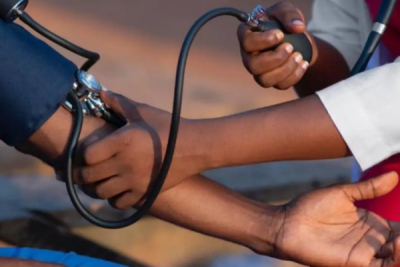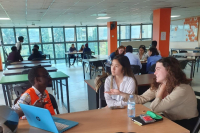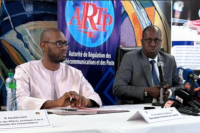Although digital advancements present opportunities for growth and development, they also unfortunately provide a platform for criminals to exploit, undermining their positive potential.
In Ghana, 422 individuals involved in illegal digital lending were arrested in a joint operation recently carried out by the Cyber Security Authority (CSA), the Bank of Ghana (BoG), and the Economic Organised Crime Office (EOCO). They are accused of cyberbullying, extortion, and abuse of customer data. The operation was carried out across three locations in the Greater Accra Region on July 10.
The arrests were made in the framework of a joint investigation, part of the Joint Cybersecurity Committee (JCC) activities, which resulted in the apprehension of 419 Ghanaians, one Chinese, one Pakistani, and one Indian suspect. Seized items included 654 mobile phones, 22 laptops, and 800 SIM cards.
At a press conference, the three agencies involved in the operation indicated that the joint investigation aims to enforce relevant cybersecurity, banking, and crime prevention laws.
The CSA had received over 270 reports of cyberbullying, extortion, and other illicit activities since December 2022. Following their investigations, the Cybersecurity authority identified and shared findings on 150 unlicensed applications involved in illegal practices.
EOCO, responsible for safeguarding financial market integrity, formed a joint technical task force with BoG and CSA to target unlicensed digital loan platforms. COP Maame Yaa Tiwaa Addo-Danquah (Executive Director of EOCO) warned the public against engaging with illegal financial entities online, affirming EOCO’s commitment to enforcing financial market regulations.
The collaborative effort is a significant stride in Ghana's fight against cybercrime and aims to protect citizens from fraudulent lending practices. By fostering a secure digital environment and upholding financial market integrity, authorities are working to safeguard the public's financial well-being.
Hikmatu Bilali
In Africa, more e-mobility apps are emerging. They are appealing both to locals and tourists, mostly because they are safer and more transparent than traditional taxis.
Developed by a Moroccan startup, VotreChauffeur.ma is a digital platform that lets its users book luxury cars with a driver. The Casablanca-based startup was founded in 2014 by Jawad Ziyat and Ismael Belkhayat.
The platform can be accessed on computers but also on Android and iOS devices. On mobile devices, the user needs to register on the App after downloading it. Taxis booked via the platform can be used for intra-city trips, excursions, tourist circuits, or airport transfers. Drivers can also be booked for a given duration.
"The only criterion we take into consideration is whether you want to keep the car with its driver in Casablanca, or outside this city. From that point on, you are free to make all the trips you need, all services are included in the price announced at the time of your reservation," the startup indicates.
The user also has a choice of the type of car. VotreChauffeur.ma has sedans and vans and the type of car affects the rates. Wifi, phone charger, bottled water, newspapers, and magazines are all services available on board the startup's vehicles.
"Prices depend on the option chosen and the city you are located. Our rates are primarily calculated based on the reserved route and the distance of the driver from your starting point," the platform notes. It is possible to view from the web platform and the application the list of available drivers in real-time.
In addition to Casablanca, VotreChauffeur.ma is present in Agadir, Marrakech, Rabat, Fès, and Tangier. On Google Store (Android), the App already totals over 10,000 downloads.
Adoni Conrad Quenum
Benin, like most African countries, considers the digital economy as an important component of its development. One of the actors advancing technological innovation in the country is EtriLabs hub.
EtriLabs is both an innovation ecosystem and a community of individuals keen to co-create and collaborate on projects aimed at solving major problems at the national and international levels.
Founded in 2009 by Senam Beheton, its CEO, Etrilabs’s vision is to foster an entrepreneurial culture focused on innovation, creativity, and sharing, by creating an environment conducive to the emergence of world-class solutions.
Like most innovation centers, EtriLabs offers a well-equipped co-working space for entrepreneurs, designers, developers, and marketing specialists.
The hub is based in Benin and Senegal. In the former, it has two centers in Cotonou (South) and one in Parakou (North). In the latter, it has one center in Dakar, the capital. Its three areas of intervention are ecosystem development, enterprise acceleration and incubation, and digital innovation. As part of ecosystem development, it provides several digital training programs, such as the Learn2Code camp which trains children in computer programming and graphics.
With EtriStars, which regroups all its acceleration programs, EtriLabs meets the needs of young companies and helps them overcome the challenges they face by providing them with support and access to essential resources.
EtriLabs also offers tailored solutions to businesses, individuals, non-governmental organizations, and governments. Whether it's developing a brand image, introducing an innovation strategy within the institution, or integrating new digital technologies, the center helps its trainees achieve their goals.
Besides training programs, EtriLabs offers workshops and seminars on various topics. It also organizes events to promote networking, product and service demonstrations, and fundraising.
With the help of its partners, EtriLabs has supported more than 1,000 entrepreneurs in 14 sectors of activity. Among the companies it has supported are fintech FedaPay, Ylomi which connects artisans with potential clients, and healthtech Rema.
Melchior Koba
After he completed his master's degree in energy economics in France, he returned to his home country where many people still struggle to have electricity. There, he founded ARESS, an innovative solution that solves this issue through solar energy.
Léonide Michael Sinsin (pictured) is a doctor in energy economics, who graduated from the Paris Dauphine University. He completed his whole schooling in France, and in 2012 during a trip to Benin, his country, he founded with Paul Berthomieu, a classmate who went with him, African Renewable Energy System Solutions (ARESS). Sinsin had just completed his Master’s. He is ARESS’ CEO.
ARESS is a small and medium enterprise (SME) specializing in the field of renewable energies. Active in Benin, Togo, Burkina Faso, and Senegal, ARESS sells solar equipment, sets up solar installations, and provides energy audit and maintenance services.
At first, the business was selling energy equipment but quickly realized that rural customers had issues making the payments, despite having the capacity to pay in installments spread over months.
Sinsin and Berthomieu, however, found a way around this challenge. They set up a system that automatically deactivates the equipment in case of non-payment. Buyers could still pay in installments over 36 months.
In 2016, the new startup, MyJouleBox, which develops equipment, software, and economic and social solutions to innovate in solar development, was born from this Pay As You Go model. In 2022, the company was part of the top 45 most innovative startups in Africa at the AfricaTech Awards.
Since 2022, Léonide Michael Sinsin has also been the president of the Interprofessional Association of Renewable Energy Specialists of Benin (AISER-Benin), which promotes and defends the interests of actors in the renewable energy sectors. Between 2012 and 2015, he worked as a senior technical writer for the pan-African think tank "L'Afrique des Idées".
Melchior Koba
Digital technology is quite important for the Guinean government. The country already has many digital projects underway, and others waiting for funding to be launched.
Guinea's Minister of Posts, Telecommunications, and the Digital Economy, Ousmane Gaoual Diallo, met with a delegation from the World Bank led by Franz Drees-Gross, the institution's regional director for infrastructure, on July 18.
The Minister of Digital Affairs sought the support of the global financial institution for the implementation of several digital projects in Guinea, namely the West Africa Digital Integration Project (WARDIP), e-procurement, covering white areas, stimulating competition in telecoms, launching the national telecoms operator Guinea Telecom, and landing a second submarine cable.
Franz Dress-Gross showed a lot of interest in all of these projects, and new interviews were scheduled to expedite ongoing projects. Before this meeting, Ousmane Diagana, the World Bank's Vice President for West and Central Africa, announced the World Bank's intention to increase its funding in the digital economy in Guinea.
"The digital economy is a factor that can be a development accelerator, but also an element to help equalize access opportunities for all citizens to several services. We plan to significantly increase our funding in these areas. Better yet, ensure that existing programs, which are numerous in these sectors, can be executed more quickly," Diagana stated on Monday, July 17, following a working session with Guinea's Prime Minister, Bernard Goumou (pictured in the center).
The talks were held during a two-day visit to Guinea by a World Bank delegation led by Ousmane Diagana. Several topics were discussed during the visit, including job creation, human capital strengthening, and climate resilience consolidation.
Samira Njoya
E-health startups are proving quite useful in helping the people of Africa have greater access to healthcare. In the Democratic Republic of Congo (DRC), a tech entrepreneur has developed a customized solution for his fellow citizens.
Congo Medika is an e-health solution developed by a Congolese startup. The platform’s users can book appointments with physicians for visits at home or their workplace. They can also have drugs delivered, and get health advice. Founded in 2021, by Emmanuel Epenge, the startup is based in Kinshasa.
Creating an account is compulsory to access the platform’s services. Details required include an email address and a username. Depending on a given user’s health issues and whether they want to book an appointment, the procedure is easy to follow. Personal information, the date and time of the appointment must be filled in for booking.
After sending the request, the user will be contacted and given details about the booked appointment. In addition to this service, the e-health platform also has an online pharmacy. It's possible to purchase various drugs and have them delivered to your home. Congo Medika provides information on all the medications sold in its online pharmacy.
The health advice service includes a blog and video sections. Health-related articles are posted on the blog and the videos offer the same kind of content, only in short formats for easier understanding.
Congo Medika also has a messaging feature that allows users to chat with physicians. The platform is available on Android. The startup behind the solution works with over 120 health professionals.
Adoni Conrad Quenum
Hive Colab, Uganda’s first tech hub, is developing incubation and acceleration programs with the help of its partners to encourage and support digital innovation in the country.
Hive Colab is an innovation and incubation center, a collaborative workspace for the business and technology community in Uganda. Founded in 2010 by Barbara Mutabazi, Daniel Stern, Jon Gosier, and Marieme Jamme, its co-working center provides entrepreneurs with internet access, a professional and calm working environment to develop their ideas, host events, and collaborate.
As Uganda's first tech hub, it aims to encourage tech lovers from current and future generations to create and develop applications that address the country's development issues. It also fosters creativity and innovation in the youth, pushing them to develop world-renowned tech products.
The hub supports actors operating in the following sectors: education, finance, health, governance, and agriculture. It offers several incubation programs, including the Youth Startup Academy Uganda (YSAU) project, its flagship program. The latter aims to incubate 1,000 young entrepreneurs by 2024. The registration phase for the program's third cohort ended on July 15th.
The innovation center also offers acceleration programs such as the University Acceleration program, which aims to generate new startups or innovations that address society's daily challenges. The solutions will then be developed and scaled by the students themselves, with the support of Hive Colab, transforming their ideas into businesses.
The hub has already incubated several companies, including Easy Matatu, a mobility startup, and ChapChap, which helps MSMEs have more productive networks and expand their distribution area.
Hive Colab is supported by various companies and organizations, like The Indigo Trust, UNICEF, Microsoft, Seacom, AfriLabs, Village Capital, and Startup Uganda.
Melchior Koba
To help African entrepreneurs showcase their products across the continent and the world, a tech entrepreneur created a digital platform to facilitate commercial transactions within and beyond Africa.
Awalebiz is a digital marketplace developed by a Senegalese startup. It allows users, sellers, and buyers, to purchase and sell unique products online. The startup is based in Dakar. It was founded in 2014 by Nafy Diagne, to pool entrepreneurs from several African countries on a single platform where they could sell their products to people all around the world.
"In the spirit of the Awalé game, based on the idea of sowing seeds and reaping the fruit, our company focuses not only on online sales, our core business but also on promoting our artisans and African culture that we want to share with the world," the platform explains.
Available on iOS and Android, the platform is most accessed through its website. Users do not need to have an account, but when placing an order, the buyer must always provide their billing and delivery address.
"Sellers from all African countries are showcasing their products. The Cameroonian buyer gets delivered from Kenya, the South African buyer from Senegal, and the Australian buyer from Benin. We cast the net to connect the continent from all sides, and of course, to connect it to the rest of the world. The spirit is Pan-African. The ambition is global," the platform states.
Delivery times depend on the chosen delivery method, where the item will come from, and the buyer’s location. The platform provides a reasonable time range within which items are likely to be delivered.
In 2017, Awalebiz won the first prize in the third edition of the Linguère Digital Challenge. As a result, the startup received financial support, in the form of a check of CFA7.5 million (about $12,867), as well as technical support worth CFA2.5 million.
Adoni Conrad Quenum
5G will soon be deployed in Senegal. Sonatel recently won the bid to commercialize the technology in the country.
Senegal’s telecom regulator, the ARTP, has provisionally awarded the 5G license to the Sonatel group through its commercial brand Orange. Abdou Karim Sall, the director general of the watchdog, announced on July 17, 2023, during a press conference in Dakar.
L' artp a attribué la 5G à la Sonatel. L'opérateur historique a déboursé 34,5 milliards de CFA pour avoir la technologie de la cinquième génération(5G). L’Autorité de Régulation des Télécommunications et Postes (ARTP) avait lancé la procédure d’appel à candidature pour… pic.twitter.com/pZo1TlpdMf
— A.P.S - Sénégal (@APS_Senegal) July 17, 2023
According to the ARTP’s boss, Sonatel paid CFA34.5 billion (€52.7 million) for the technology. "The main goal is to allow all operators who wish to have a 5G license for the great benefit of users [...] We had set a reserve price of 19.5 billion FCFA. When we proceeded to the counting, we retained that of Sonatel since its offer was compliant," said Abdou Karim Sall.
The ARTP issued a call for bids on May 31 for operators interested in deploying the technology in Senegal. Three operators – Free, Sonatel, and Expresso – submitted bids.
Following the bidding, Free and Expresso were taken out because they did not respect the clause of the reserve price set at CFA19.5 billion, leaving Sonatel as the winner.
In the coming days, Sonatel will have to sign the concession agreement and specifications alongside the ministries in charge of Telecommunications and Finance. Afterwards, the President of Senegal will issue a decree and the ARTP will give its final approval for the official deployment of the 5G technology.
Deploying the technology in Senegal will enable Sonatel to meet the population’s growing demand for high-speed connectivity and new digital consumption modes, influenced notably by Covid-19.
Samira Njoya
With financial technology growing rapidly across Africa, more local companies have been developing several solutions to offer consumers interesting alternatives to traditional financial management software.
Tresorerie.ma is a digital platform developed by a Moroccan start-up. It allows SMEs and managers, to manage cash flow, centralize and pay supplier invoices, and follow up clients from a dashboard. Based in Tangier, the startup was founded in 2022 by Hicham Berrahou.
"Tresorerie.ma offers a service complementary to accounting: thanks to Tresorerie.ma, you can anticipate and follow the evolution of your cash flow in real time. This will not impact your accounting process. Your accountant can therefore continue to manage your accounts without any problem," the platform states.
To access the fintech's services, users need to visit the platform and create an account. It offers several pricing grids and a trial for a few days. Among other things, users will need to provide information such as their first and last name, email, company name, and their position within their company.
The platform offers distinct registration options, depending on the number of users. Annual packages cost 249, 490, and 890 dirhams (about $242) respectively for 1, 3, and 5 users. The 5-user package includes all features of the solution, unlike the other packages. These include the integration of various accounting software, a cash flow simulator, and cash flow forecasting. Moreover, bank transactions between Tresorerie.ma and users’ bank accounts are unlimited, whereas they are limited to 100 with the basic package.
Regardless of the package picked, users can, from the dashboard, synchronize and automatically categorize all of their company's banking operations, model and test different development scenarios, analyze various indicators to get an idea of the company's financial health, or even create personalized recovery plans.
The fintech also has a mobile application, but it is not available from the Play Store or Appstore. Tresorerie.ma claims to have over 325,000 active users and more than 94 tracking indicators available to its customers. It also offers personalized business support.
Adoni Conrad Quenum
More...
Dakar’s Cheikh Anta Diop University (UCAD) switched to online learning in mid-June. To strengthen its offering, the university is signing partnerships and multiplying efforts to meet the needs of thousands of students.
Dakar’s Cheikh Anta Diop University (UCAD) and the National Telecommunications Company of Senegal (SONATEL) signed a partnership agreement last Friday, July 14. The move is to launch the "Pass UCAD" program, whose goal is to allow UCAD’s students and teachers to access the university’s dedicated online learning platform for free.
SONATEL’s Managing Director, Sékou Dramé (picture on the right), announced the establishment of a platform that allows students to continue classes online. "From next week, it will be implemented. This platform will allow students to identify themselves and access this specific 'Pass UCAD' issued for students, which will allow them to connect to the online teaching platform set up by the university for free until October 31," he said.
A month ago, the Senegalese government decided to adopt online education in the country's public universities amidst violent protests that broke out after opposition leader Ousmane Sonko was convicted. Many universities’ facilities were destroyed during the protests; these include six UCAD faculties.
The new partnership with SONATEL will support education and promote internet access for UCAD students. It will also allow students to benefit from educational resources and online research, as well as strengthen their digital skills, and prepare them for the digital future.
Samira Njoya
The Angolan government has been taking many steps to reform its administration through digitalization. To speed up this process, the country is now teaming up with major tech actors.
The Administrative Modernization Institute (IMA), an auxiliary body of the Angolan Republic's presidency responsible for public administration modernization, and Dell Technologies, an American company providing tech solutions, services, and support, signed a strategic cooperation agreement in Dubai on Friday, July 14. The partnership aims to promote digital governance in Angola.
"The memorandum of understanding between the IMA and Dell Technologies establishes comprehensive cooperation in the field of digital governance. It anticipates the exchange of experiences, knowledge, and best practices, with a focus on the quality of public services, digitization of the economy, improvement of the business environment, support for entrepreneurship, training, and creation of human capital skills," the IMA wrote in a statement.
Last May, IMA took part in the "Dell Technologies World" conference. Organized by Dell, the conference aimed to accelerate digital growth and technological development in the world. The new deal aligns with the Angolan government's ambition to speed up digital growth as well, locally, and with the Angolan people, with various online government services.
Last February, Luanda announced an investment of $89 million to build its national cloud infrastructure by 2024. The digital infrastructure, built across the government’s centers, is expected to provide over 80 public services.
The partnership with Dell will support the ongoing digitization process of public administration in Angola. It should also allow the country to boost its e-government development score. On the UN’s 2022 e-Government Development Index, Angola ranked 157th out of 193 countries, placing it among countries with a medium level of electronic administration development.
South Africa is taking a significant step towards embracing the digital revolution, leveraging Huawei's expertise, and unlocking the potential of advanced technologies for economic development and societal progress
South African President Cyril Ramaphosa inaugurated, on July 13, the Huawei Innovation Centre in Woodmead, Johannesburg. The cutting-edge facility, established by Huawei South Africa, aims to foster joint innovation, collaborate with local partners and developers, and showcase advanced digital technologies.
President Ramaphosa praised the Innovation Centre, calling it an impressive hub for technological breakthroughs. He highlighted its crucial role in propelling South Africa and the wider African continent into the Fourth Industrial Revolution, with technologies like 5G, Cloud, and AI being showcased at the centre.
The President emphasized the government's commitment to digital transformation, expressing hope that the Innovation Centre would spur the launch of local ICT enterprises and create employment opportunities. He acknowledged the significance of digital technologies in achieving national development goals and commended Huawei's confidence in the South African economy.
President Ramaphosa also acknowledged the role of digital technologies in enhancing sectors such as mining and transportation. He referenced the successful launch of the first 5G coal mine in South Africa, facilitated by Huawei's partnership with industry stakeholders and telecom partners, as an example of the company's contribution to the country's economic potential. “The application of digital technologies to improve production processes spans a broad range of economic sectors from mining to ports to transportation and others,” he said.
Furthermore, he emphasized the importance of knowledge transfer, skills development, and the growth of small and medium-sized enterprises (SMEs), and applauded Huawei's efforts in cultivating local digital talent through initiatives like the LEAP digital talent program, ICT academies, and Tech4All-DigiSchool projects. These initiatives align with the government's vision of empowering the youth and enabling their participation in the digital economy.
The Chinese Ambassador to South Africa, HE Chen Xiaodong, highlighted the significance of the Huawei Innovation Centre as a symbol of South Africa-China cooperation. He emphasized China's commitment to supporting South Africa in accelerating 5G deployment and embracing the Fourth Industrial Revolution.
Leo Chen, President of Huawei Sub-Saharan Africa, commended South Africa's strong vision for its digital economy and its role as a continental and global role model for 5G deployment and industrial digital transformation. Chen reaffirmed Huawei's commitment to supporting South Africa's ICT infrastructure development and industry digitization through the introduction of the latest technologies. He also emphasized the company's dedication to training young South Africans, enabling their participation and benefit from the digital economy.
The inauguration ceremony was attended by various dignitaries, including Minister Stella Ndabeni Abrahams (Small Business Development) and Minister Sindisiwe Chikunga (Transport), along with representatives from government departments. Their presence underscored the government's endorsement and support for the Huawei Innovation Centre and its potential to drive the country's digital agenda.
With the inauguration of the Huawei Innovation Centre, South Africa takes a significant step towards embracing the digital revolution, leveraging Huawei's expertise, and unlocking the potential of advanced technologies for economic development and societal progress.
Hikmatu Bilali
Initially named Tayar, this startup was founded in 2018 by Hassan Kamel and Mohamed Gessraha. It was later rebranded and shifted its focus to AI-based solutions that support startups operating in the delivery sector. The Cairo-based startup provides a technological solution that assists companies operating in the e-commerce, retail, and delivery service sectors in better managing their last-mile delivery operations.
Since its inception, the startup has raised over $700,000 to develop its technology and accelerate its growth. Roboost's service includes order collection, route optimization, delivery agent management, and real-time monitoring of all delivery operations.
"Radical and transformational change in delivery operations has positioned us as the optimal solution for local and multinational brands that we are proud to serve with a 100% retention rate," explains Hassan Kamel. By integrating Roboost's programming interface, businesses can harness its AI capabilities to reach their full operational potential.
The AI solution provides detailed reports on each operation and evaluates the performance of delivery agents. In the case of multi-branch startups, the system allows for performance comparison across various locations. Companies can monitor operations on the web platform or mobile application which is available on iOS and Android, with AI handling all processes autonomously.
"With data collected from more than 2,200 delivery agents who have traveled more than 9 million kilometers, we are always looking for new ways to improve our clients' delivery operations and add new features," says Hassan Kamel.
Adoni Conrad Quenum


